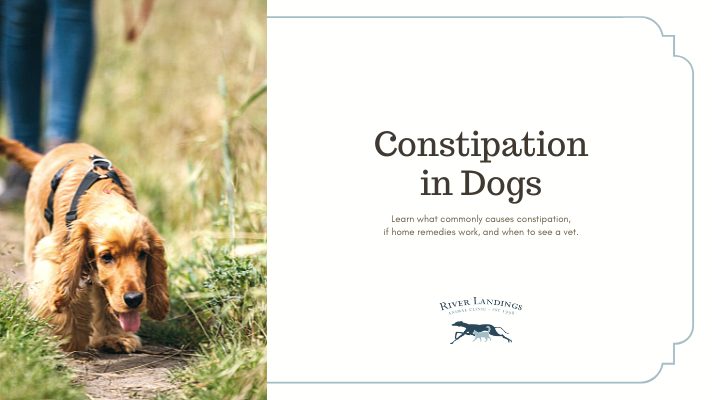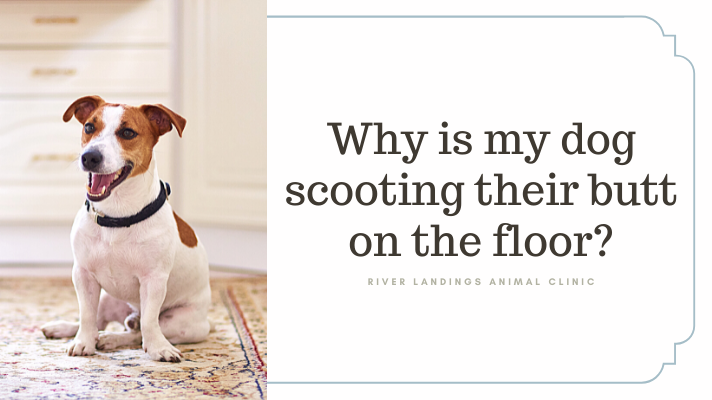Like in people, dogs can sometimes have trouble passing stool. And, it can get awfully uncomfortable. Even worse? Dog constipation intensifies the longer it goes on. That's because as the stool sits in the colon (large intestine), it continues to dry out and becomes harder, which makes it increasingly difficult to pass.
However, surprisingly, constipation in dogs doesn't happen nearly as often as one may think. A lot of pet parents see their dogs straining to go with nothing coming out and think it's constipation. But actually, it's often diarrhea, which causes irritation and a sensation of needing to go even when there's nothing to push out. Read on to determine if your dog truly has constipation and, if so, what to do to help your pup feel better.
What Causes Dog Constipation?
Several things can make it difficult for dogs to poop.
Inedible Items
News to no one: Dogs eat weird things. Many of our canine friends have a habit of swallowing inedible, everyday objects that can land them in the emergency room (think: socks, toys, rubber bands, and rocks). As these items move along the digestive tract, they can get stuck in the colon and stop up your pup.
Consuming kitty litter or sand can also make it hard to push stool out. Believe it or not, a dog can get constipated because of ingesting sand from playing on the beach—just from grabbing a ball or frisbee from the sand multiple times.
Dietary Problems
Eating pure protein with no fiber can lead to constipation in some pets too. And according to the American Kennel Club, too much dietary calcium—from chewed-up bones or bone meal—can be a source of constipation.
Partial Pooping
Constipation is more common in senior dogs, especially if they have severe arthritis that makes it painful for them to crouch while pooping. They might cut their bowel movement short and not fully evacuate everything. The stool that remains inside the colon becomes drier and harder and blocks the colon.
Tumors
When something blocks the movement of poop through the colon, it's not usually from within the colon itself. It's typically caused by something pressing in on the colon in the surrounding area. For example, in male dogs the colon could become blocked by an enlarged or cancerous prostate. Tumors of the anal glands and lymph nodes can also press in on the colon.
Dog Constipation Symptoms
Most dogs poop at least once a day. So if your dog hasn't gone in one or two days, they may be constipated. Other signs your dog is having trouble pooping include:
Straining to go several times a day
Producing hard clumps of stool
Scooting butt along the ground
Whining or yelping while trying to go
If you're concerned about dog constipation, contact your veterinarian for the next steps. A discussion with your vet—who knows your pet's age and health condition—will help determine if it's something you can treat at-home (like constipation caused by dietary issues) or if your pet needs an exam to rule out other, more serious causes of constipation.
What to Give Your Dog for Constipation
There are a lot of home remedies for constipation in people, so it's natural to seek these out for your pup too. However, most of these popular health hacks don't work.
Pumpkin
One of the most commonly used home remedies for dog constipation is canned pumpkin. Most pet parents feed their dogs a few tablespoons of it. But in order for it to be effective, you dog will have to have several cans. This is fine for the long term, but at once? Since dogs should stick to a nutritionally balanced diet, multiple cans of pumpkin would not contribute to that goal.
As a general rule, treats should be kept to a maximum of 10 percent or less of a dog's diet. A 10-pound dog needs about 200 to 275 calories per day according to Pet Obesity Prevention, meaning only 20 to 27 calories can come from a treat like pumpkin. At about 49 calories per cup, a small 10-pound dog could only eat about 1/4 of a can of pumpkin before reaching the treat limit for the whole day.
Milk
Milk can cause diarrhea in dogs. Perhaps that's the reasoning behind why some people think it'll counteract constipation. But usually, it doesn't end up doing the trick and be the opposite effect.
Coconut Oil
The concept behind using coconut oil is that it'll make stool oiler, which will help it slide out. The problem? It won't affect the poop that's already stuck, although it may help stool that comes along later. However, more than a tablespoon or two of coconut oil (depending on your dog's size) can be a risk for pancreatitis and diarrhea, so consult your vet before trying this or any other home remedy.
Get Exercise
The colon can be stimulated by physical activity. Going for regular walks, playing games like fetch, or taking your pup to their favorite dog park could help encourage a bowel movement.
Over-the-Counter Medications
Reach out to your veterinarian to determine if using over-the-counter medications for dog constipation is an option for your pet. It'll depend on how long the problem has been going on, how painful it is for your pet, and the age of your canine.
Veterinary Treatment for Dog Constipation
Pets that are constipated often need the assistance of a veterinarian to get things going again. Vets treat constipation in dogs in a few different ways, depending on the severity. Medications, like laxatives, may be enough to do the job. But in more serious cases, your pet may need anesthesia so that the vet can massage the colon through the abdomen to break apart the stool or to administer an enema (an injection of fluid into the colon that stimulates the release of stool).
With constipation, the longer it continues, the more difficult it is to treat. So if you think your pet is constipated, it's always best to deal with it sooner than later. Don't delay in getting your four-legged friend back on track. You and your pup will feel so much better once their load is lightened.
Hear From Us Again
Don't forget to subscribe to our email newsletter for more recipes, articles, and clinic updates delivered straight to your e-mail inbox.
Related Categories:



